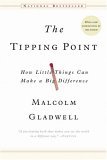Current "NICU" Book

The Tipping Point - Malcolm Gladwell
Internet Review: The premise of this facile piece of pop sociology has built-in appeal: little changes can have big effects; when small numbers of people start behaving differently, that behavior can ripple outward until a critical mass or "tipping point" is reached, changing the world. Gladwell's thesis that ideas, products, messages and behaviors "spread just like viruses do" remains a metaphor as he follows the growth of "word-of-mouth epidemics" triggered with the help of three pivotal types. These are Connectors, sociable personalities who bring people together; Mavens, who like to pass along knowledge; and Salesmen, adept at persuading the unenlightened. (Paul Revere, for example, was a Maven and a Connector). Gladwell's applications of his "tipping point" concept to current phenomena--such as the drop in violent crime in New York, the rebirth of Hush Puppies suede shoes as a suburban mall favorite, teenage suicide patterns and the efficiency of small work units--may arouse controversy. For example, many parents may be alarmed at his advice on drugs: since teenagers' experimentation with drugs, including cocaine, seldom leads to hardcore use, he contends, "We have to stop fighting this kind of experimentation. We have to accept it and even embrace it." While it offers a smorgasbord of intriguing snippets summarizing research on topics such as conversational patterns, infants' crib talk, judging other people's character, cheating habits in schoolchildren, memory sharing among families or couples, and the dehumanizing effects of prisons, this volume betrays its roots as a series of articles for the New Yorker, where Gladwell is a staff writer: his trendy material feels bloated and insubstantial in book form.
For a little deeper read, this might be a good one. We'll see what Ma thinks when she's done, but so far, she's really enjoying it.

0 Comments:
Post a Comment
<< Home